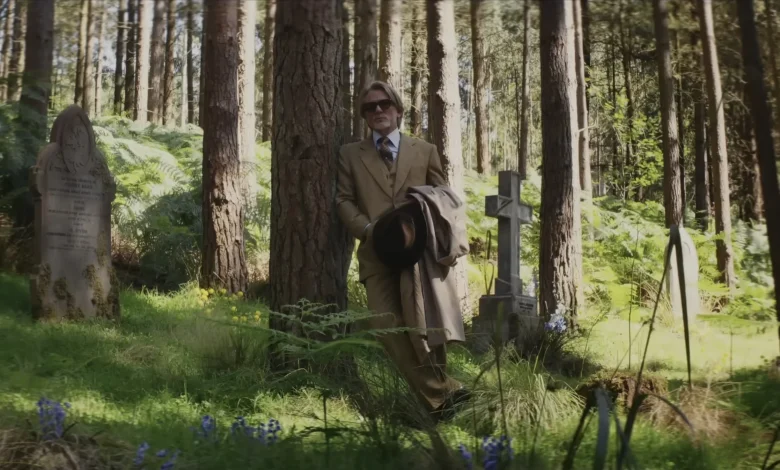Wake Up Dead Man Is a Miraculous Film

I love Wake Up Dead Man. It may not be the best of the three Benoit Blanc mysteries, but it is my favorite, and, unless something truly cinematically extraordinary happens in the next six weeks, it will tie with Sinners as my favorite film of the year.
Because I’m lucky and live in a city that hosted some early screenings, I’ve already seen it twice in the theater, and I’ll be seeing it at least two more times before it hits Netflix on December 12th. (I don’t just love this movie, I New-York-City-ticket-price love this movie.) In my screenings there were choruses of “WHAT???”s and “Oh, NO!!!”s at relevant moments. During the first screening, I heard more laughter in the first hour than I have in most comedies I’ve been to lately; the second audience was so intent during the film’s third act that the air actually felt thick. If you’ve liked any of Rian Johnson’s previous work, and if Wake Up Dead Man is playing in a theater near you, you should try to see it in as packed a theater as is safe for you.
Don’t worry, I won’t be getting into spoilers in this review—but come back for a full spoiler discussion in December, once Wake Up Dead Man is available to everyone on Netflix.
Wake Up Dead Man is two movies grafted together—I think one works slightly better than the other, but they’re both extremely good, hilarious, relevant, and moving. One side of the movie is another excellent Benoit Blanc whodunnit, one of the locked room (locked tomb?) variety—full of twists, betrayals, reversals, and clues. The other is a nuanced conversation between faith and reason, in which both are treated fairly and respectfully—saying too much on this part of the plot will get us into spoilers, so I’ll revisit it in December.
Credit: Netflix
Also, before I get into it, there is a line in this film, that—OK. Do you remember a few years ago, when Guillermo del Toro said: “if God offered to shorten my life to lengthen [Martin] Scorsese’s—I’d take the deal”? There is a line in this film that I would, with zero hesitation, give up a decade of my life to have written. I didn’t even laugh when I heard it—my brain shorted out and I made some sort of horrifying guttural choke, and I missed the following lines because I was stunned at how good and concise it was, and how much it told us about the character who said it. (Oh, and on the off chance God reads the site: I’ll see del Toro and raise him as far as the Scorsese deal goes.) And to be clear: that line isn’t even the best one in the movie. It’s a throwaway gag—but it’s a throwaway gag that I might get tattooed on me in the near future.
With that out of the way:
I loved both of the prior Benoit Blanc mysteries for different reasons. The autumnal, cozy, warm-sweater-with-a-hole-in-it vibe of the first Knives Out was precisely my jam, but I also love the sun-drenched satire of Glass Onion—I know it has its detractors, but I admire a movie that tells you its plan and then goes for it. The latest entry is more ground-level than the second one. The story swirls around the congregation of a conservative Catholic Church. While most of them are upper middle class, we’re not on somebody’s private island, just a lovely village in Upstate New York. The mystery itself is the culmination of a dark, almost gothic story of religious mania, parental abuse, and sexual repression that has become a legend in the town.
Father Jud Duplenticy (Josh O’Connor) is sent to assist Monsignor Jefferson Wicks (Josh Brolin) at Our Lady of Perpetual Fortitude. He quickly finds that the Monsignor (who insists on being called “Monsignor”, not “Father”—which tells you a lot about the man) has used his strong personality and fiery sermons to inspire cult-like devotion in his congregation. They’re not happy that Father Jud has joined them; they seem him as too soft, and they distrust his openness and empathy.
The congregation consists of: Vera Draven (Kerry Washington), a successful lawyer,;her adopted son, Cy (Daryl McCormack); Lee Ross (Andrew Scott), a sci-fi writer whose popularity has fallen off a cliff as he’s become increasingly conservative and paranoid; Dr. Nat Sharp (Jeremy Renner), the town doctor who is extremely depressed about his recent divorce; Simone Vivane (Cailee Spaeny), a cellist with chronic pain issues who looks to Monsignor Jefferson Wicks for healing; Samson Holt (Thomas Haden Church), the parish groundskeeper; and Martha Delacroix (Glenn Close), the parish administrator who was practically raised by Wicks’ father, and who knows everything about everyone.
Credit: Netflix
By the time the murder happens, almost everyone in that list has a motive, but given the locked room nature of the crime, most of them did not have the opportunity.
It goes without saying that the cast is excellent, but I’ll say it anyway—they’re all fantastic. Glenn Close in particular is mesmerizing, layering in real obsession under what at first seems like a prim church lady stereotype, and I will once again voice my hope that this is finally her year at the Oscars. Kerry Washington gets an incredible burn-it-all-down speech that is one of my favorite moments in the movie. And once again, Rian Johnson is astonishingly good at skewing a particular archetype of online bro from a bunch of angles, and Daryl McCormack is fabulous as dead-eyed wannabe politician Cy Draven, the incel Charizard to Rian Johnson’s earlier manosphere forms, Jacob Thrombey and Duke Cody.
But really this movie is about a trinity: Josh Brolin’s Monsignor Wicks, Daniel Craig’s Benoit Blanc, and Josh O’Connor’s Father Jud. Brolin is transcendently shitty as Wicks, performing exactly the kind of arrogant, bigoted, wild-eyed blowhard who could create a conservative cult, while also showing us (and, occasionally, Father Jud) that it is a performance.
I think this is Craig’s best turn yet as Benoit Blanc. He’s given a chance to shade in a little more backstory, and he runs with it, layering years of repressed emotion into a few lines (and seeding the emotional punches at the end of the film perfectly) while also still having fun—absolutely impeccable comedic timing.
Credit: Netflix
But as good as everyone is, these movies really live or die by their protagonists, and it brings me great joy to say that Father Jud is a worthy successor to Marta and Helen, and that Josh O’Connor is perfect in the role. Father Jud is a difficult role—play it too straight and you’re a naif walking into a propeller, but add any snark, like any snark, and you undercut Jud’s extraordinary humanism. Go too broad and you make him pathetic, make him too cool and you lose the desperation of the plight he’s in. Everything he does feels true—there are moments where Father Jud and Blanc are practically a comedy double act, and he’s perfect; there are moments when he has to be so vulnerable and raw it’s genuinely hard to watch, and he’s perfect. I think Josh O’Connor might be my favorite actor at the moment, and there was not one moment in this film where I caught him acting.
As has been discussed many times, part of the fun of the movies is that when we meet Benoit Blanc, a tall, handsome, blonde Southern man, a detective who is himself the son of a police chief—he seems, at first, like a pretty establishment type of person. But he turns out to be wildly empathetic and sensitive, he loves Sondheim, and he’s in this game for the truth, not to buttress the powerful. In the second film we learn that he’s queer, and living with a man named Philip, played by Hugh Grant. (In the new one we learn a little more about his background, a hint that his childhood may not have been exactly idyllic, and more slots into place—but he is still a mystery. We only know a few more things about him by the end, which is as it should be.) But my point is that this man, who could coast on his brains and his looks, is instead driven in his pursuit of the truth. In the first two films, as plenty of people have pointed out, he acts as a mentor and support beam to two young women of color who have been put in impossible, tragic situations by powerful white people. This one breaks that pattern to an extent. Instead of a vulnerable young woman, we get Father Jud, placed in an impossible, tragic situation by a more powerful white person in the form of Monsignor Jefferson Wicks.
This is a locked room mystery. Plot-wise, it draws a bit on The Hollow Man by John Dickson Carr (published as The Three Coffins in the U.S.); tonally, there’s a heavy strain of Edgar Allan Poe. Benoit Blanc refers to the congregation as a flock of wicked wolves and he is not exaggerating—there’s a lot of dark stuff happening here. The central murder is seemingly impossible, and other violence follows. There are moments where the film almost tips into horror.
Johnson has talked about trying to play fair with the audience. I can’t speak as well to this because I never figure mysteries out—in all of my time reading and watching them, I’ve literally only figured the killer out ahead of time once, and even then I didn’t see it until a few pages before the detective. I will say that this one seems a little more convoluted than the other two films, but when I watched the second time I noticed each detail, and the mystery does definitely make sense, and the clues are shown to the audience—it’s a just a more tangled web this time around.
Credit: Netflix
Nathan Johnson’s score is fabulous, and visually this movie is gorgeous. The sets, by Rick Heinrichs, are fantastic—especially the church with its Moby Dick-inspired pulpit. Once again Steve Yedlin makes everything glow, and the use of shadow and light are really pretty, but also thematically meaningful.
(Also, in two instances, the use of light made me cry.)
My one, very small, critique, is that they shouldn’t be marketing this film as the ensemble the two previous films were. The supporting cast is incredible, and everyone gets some juicy moments, but this movie really turns on the interactions of Monsignor Wicks, Father Jud, and Blanc. I’m only mentioning that critique here in the non-spoiler review because if you go into this expecting it to be as much of an acting hacky sack game as Glass Onion was, you might be a little disappointed—but again, the story between the main three characters is so good I didn’t much care.
Now about that second movie.
The actual reason I brought God up at the top of this review (other than my love for Mr. Martin Scorsese) is that this film is about battling interpretations of religion.
Each of the Benoit Blanc mysteries is named after a song that becomes relevant to the film’s theme. This time out Johnson is homaging two songs: a Pete Seeger cover of a Leadbelly song that has a line about a dead man waking up, and a U2 song called “Wake Up Dead Man” (one of their strongest, I think, despite a guitar riff I detest), which is essentially Bono spitting accusations and occasional pleas at Jesus. It’s harsh, and unique in their oeuvre for ending on a note of ambiguity rather than faith.
It’s an interesting choice for a title.
Johnson has talked about this film being personal to him, and that it’s informed by the serious Christian faith he had in his younger days, and the fact that he does not have that faith now. He’s said that he wanted to see if a serious conversation about faith could fit inside of a murder mystery. But what I loved here is that this is a conversation. Wake Up Dead Man isn’t someone beating you about the head with their faith, or with the idea that faith is wrong. Two characters in particular stand on opposite sides of the faith/reason divide, and they treat each other with deep respect and affection—they simply don’t agree. But to be clear, this never becomes an argument between a character who reps “Faith” and one who has “Reason” emblazoned across their forehead—there are a lot of different strains and personal interpretations of Christianity roiling around the congregation of Our Lady of Perpetual Fortitude, and those all get time to argue with each other, as well.
Johnson understands that none of this is a monolith. And he also understands that unless we start having real conversations with each other about this stuff—conversations, not hate crimes and personal attacks—we’re, uhhhh, fucked.
Father Jud, Monsignor Wicks, and the members of the congregation would say they all believe in the same God, but in actuality there are a lot of different interpretations of the Divine getting thrown around Our Lady of Perpetual Fortitude—and that’s before we even get to the non-believers.
Credit: Netflix
Wake Up Dead Man is a conversation about faith and reason, and within that, a conversation about different types of faith. And that’s just it, it’s a conversation. Not a “debate.” Not one smirking arrogant privileged dude in a chair waving hypotheticals and bad faith around like a Spencer’s Gifts novelty sword, surrounded by people who are desperately trying to make him understand that they’re real people, not straw people for him to “pwn”.
But here’s the other other thing. Nobody gets “pwned” here. (Well, except maybe the dead guy.) Father Jud and Benoit Blanc don’t agree on a couple things, but they respect each other, and they like each other, and they’re each able to give the other space to be.
The film hinges on the ideas of grace and forgiveness. The film believes that everyone deserves them. And here’s the thing: the film is correct. That line up there, about the dude with the novelty sword? Good line, right? Funny, sharp (heh), shows my opinion pretty clearly. But that dude in the chair deserves forgiveness and grace as much as all the people surrounding him. As much as you, as much as me. And that isn’t even a religious thing, by the way, though it can be read that way. That’s just human. Humans are the ones who extend forgiveness and grace to each other in this world—if there’s some other cosmic element to it, cool, whatever, but that doesn’t invalidate the version we have here on the ground.
Rian Johnson has created a film with real emotional depth that still functions as an entertaining, twisty, mystery. But he gives the film a separate engine by focusing on this idea of grace as well as the mystery itself. Wake Up Dead Man gives its audience all the fun of gathering clues, side-eyeing potential killers, and watching Blanc muse and pontificate, but by focusing on Father Jud’s need to fulfill his calling as a priest, I think Johnson has also written a story that will be worth returning to for its ideas, and its deep commitment to empathy for even its most broken characters.
icon-paragraph-end





